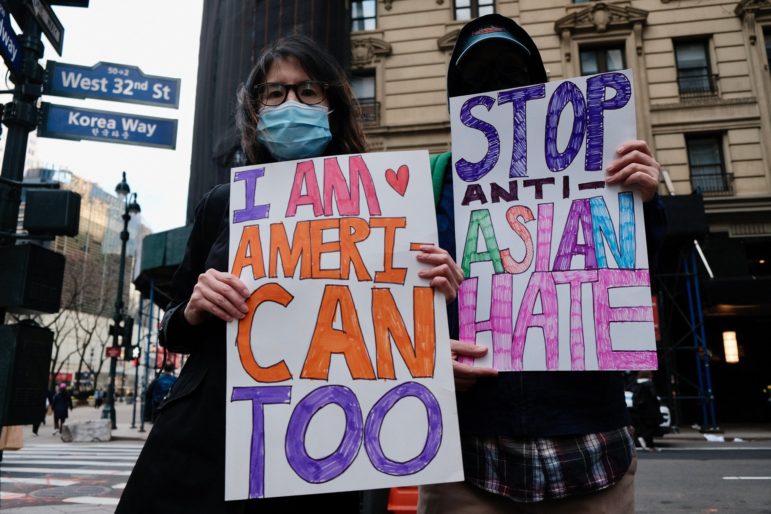‘Without more information regarding the communities that experience hate crimes and those that are accused of committing them, we cannot take meaningful steps to improve the mechanisms that we currently rely on to keep vulnerable New Yorkers safe.‘

Gerardo Romo/NYC Council
A recent rally in Manhattan denouncing the city’s uptick in hate crimes.New York State reports shockingly little information on hate crimes. This is putting us all in danger.
Though our state currently has strict criminal penalties for committing hate violence, hate crime rates are only rising. We now have an urgent need to analyze where the existing laws are falling short, and explore new measures to keep our communities safe. But if New York persists in its current slipshod approach to hate crime reporting, this crucial analysis will continue to be out of reach, and lives will continue to be at risk.
Data is a key tool for better understanding and thus preventing hate crimes. It’s time for lawmakers to recognize this and pass the Hate Crimes Analysis and Review Act (S00070/A02230), a bill that would require the collecting and reporting of more detailed, accurate, reliable information about the communities being targeted by hate crimes, and those accused of committing them.
Currently, hate crimes data is reported and analyzed through New York’s Division of Criminal Justice Services. But only certain data is required to be reported, such as where crimes were committed and the number of people who were arrested. Any further data that could enable closer analysis of the effectiveness of our existing hate crime laws is a patchwork, as it is derived from agencies that choose to participate in the voluntary Uniform Crime Reporting program. What’s more, the timing of reports is often unreliable. In fact, the Division of Criminal Justice Services failed to release annual reports of statewide hate crime statistics for both 2017 and 2018. They only did so after a news investigation from late 2019 revealed the failure.
This inconsistent approach is not enough for us to fully understand how hate crimes are being committed and how existing penalties are meted out. Without more information regarding the communities that experience hate crimes and those that are accused of committing them, we cannot take meaningful steps to improve the mechanisms that we currently rely on to keep vulnerable New Yorkers safe.
Passing the Hate Crimes Analysis and Review Act would equip us with the information our state needs to create policies that could do a better job of preventing hate violence. Under the Act, the state would need to gather and report more demographic data about the survivors of hate crimes and the people who are accused of committing them, such as sexual orientation, gender identity, race and ethnic identity, and religion.
This information would not only reveal more details about which communities are being targeted by hate crimes, but would also offer a clearer picture of who is being penalized for committing them. Once we have this clarity, aided by the certainty that the data comprehensively represents conditions across the entire state, lawmakers and community advocates can tailor policy models directly to the communities involved in hate crimes. This way, we can better support survivors and create holistic interventions that may act as a more effective deterrent than the threat of criminal penalties to prevent hate crimes from happening in the first place, including, for example, alternative ways to address the roots of bigotry and discrimination through education and other means.
No matter what the data ultimately reveals, we can be sure that as long as it is beyond our grasp, all marginalized communities are at risk. Here at New York City’s LGBT Community Center, we’re not just fighting for legislation that exclusively benefits LGBTQ New Yorkers—our statewide advocacy initiative takes an intersectional lens to its policy goals, and we recognize that many communities would benefit from the Hate Crimes Analysis and Review Act. We need it because Asian American and Pacific Islander (AAPI) communities are still facing a vicious wave of hate crimes, especially in New York City. We need it because anti-religious bias made up more than half of all New York State hate crimes reported in 2019. We need it because Black and brown people are disproportionately targeted by heightened criminal penalties, such as the ones that make up New York’s current hate crime law. And all the while, we lack the basic information that would enable us to scrutinize and improve our state’s current strategies for responding to unrelenting violence.
None of us can be truly safe until all of us are safe. It’s time for transparency. It’s time to build the foundation for stronger policies to protect New Yorkers at risk. It’s time to pass the Hate Crimes Analysis and Review Act.
Trevon Mayers is the senior director of advocacy & community engagement at NYC’s LGBT Community Center








